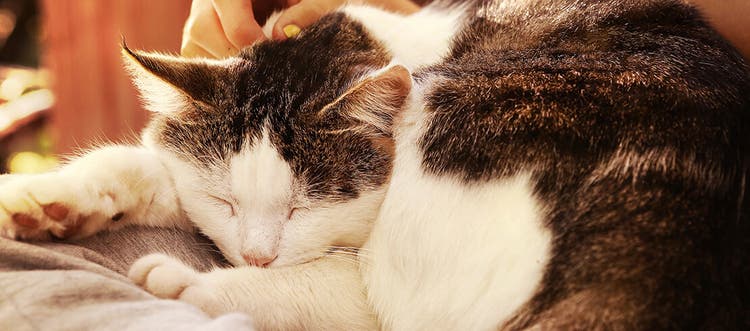Is a cat the right pet for you?
Looking for a new furry friend? A cat may be just the pet for you. If you’re debating whether a cat is the right fit, you’ll want to consider the following questions before finding the perfect new addition to your family.
What Do I Need to Know before Getting a Cat?
What are the basics of owning a cat? Regardless of what breed, age or gender you adopt, these are some standard considerations:
- Commitment: Cats can live up to 20 years, so getting a cat is a commitment that typically spans almost two decades. If you get an older cat, you’re committing to caring for them through any advanced medical needs as they age.
- Space: Cats can thrive in a variety of different housing situations, from studio apartments to large houses. The secret to creating a cat-friendly home is to utilize the vertical space by providing lots of cat-friendly perches. You will also need to designate certain locations for feeding, litter box(es) and scratching posts.
- Health: Cats should be spayed, neutered and routinely dewormed, which will help them stay healthy throughout their lifetime. Declawing cats is an extremely painful procedure that many states and cities have outlawed, so plan on keeping your kitty’s claws around.1 Cats should also have regular appointments with a vet.
- Lifestyle changes: While you can leave your cat for longer periods of time, they are still affectionate pets who want to be around their owners. Make sure you’re at home when possible to keep your furry friend company. It’s your call as a pet owner on whether to keep your cat strictly indoors or allow them to go outside, but the benefits of keeping your cat indoors include helping them avoid a disease or an injury.2 With the introduction of any pet, odds are your household routine and structure will change.
- Supplies: A litterbox, food and water bowls, cat carrier, bed and scratching posts all help you meet your cat’s basic needs. Fun toys or catnip will get them excited to be in their new home!
Should I Get a Cat or a Dog?
The debate between getting a cat or a dog often hinges on lifestyle preferences. Does anyone in your house have allergies to either animal? How often are you home? Do you lead a highly active lifestyle? Do you have kids in the family? Are you more outdoorsy, or do you like spending time at home? If you’re having a hard time deciding, here are some signs a cat might be right for you:
- You have limited indoor space and a small outdoor space.
- You have a busy lifestyle and need a more independent pet.
- You want a pet that’s affectionate, but needs less attention.
- You’d like a pet that can clean up after themself (for the most part).
- You value your peace and quiet at home.
What Breed of Cat Is Right for Me?
Yes, there are different breeds of cats, but most cat owners have what are called “domestic” short-, medium- or long-haired cats. These are the “mixed breeds” of the cat world, and they make wonderful pets. That said, your needs might affect what breed you look for. Do some cats make you sneeze? Oriental short hair, Balinese, Devon Rex or hairless Sphynx cats can cause fewer allergic reactions. Want a super-friendly cat? Abyssinian, Maine coon, Burmese or Siamese are high-energy, playful and affectionate.2-10
Of course, if you’re hoping to adopt from a shelter, you can probably find a domestic housecat with a personality that fits with yours perfectly.
Should I Adopt an Older or Younger Cat?
There are benefits to adopting older and younger cats. Kittens are an adorable new addition to your family, though you’ll need to be prepared for the bursts of playful energy, exploratory behavior and general supervision a young kitten requires. Choosing to adopt a younger cat can also mean a better chance of having a full lifetime with your pet.
If you aren’t set on a kitten, adopting an older cat is a great choice. Adult or senior cats tend to be calmer, less destructive and less expensive to adopt. Older cats’ personalities are already pretty set, so the shelter should be able to tell you if they are outgoing, laid back, energetic, affectionate or independent. If you’re looking for more predictability, older cats are often a better option.
Should I Get a Male or Female Cat?
There are plenty of speculations on the personality differences between male and female cats. Are males friendlier? Are females more aloof? Ultimately, personality just differs by cat — with the exception of any cat that is not spayed or neutered! Neutered pets are less likely to behave aggressively or engage in territorial marking behavior. Intact male cats spray to mark their territory, and females tend to howl or yowl when they go into heat.3
What Do I Need to Buy before Getting a Cat?
Here’s a checklist of the basic supplies you should get before adopting a cat:
- Carrier or crate: Be sure it’s safe, sturdy and has plenty of ventilation.
- Litter and litterbox: Most cats prefer clay clumping litter over other types of litter.
- Food and water bowls: Ask the shelter or previous owner what food they use so you can maintain the cat’s current diet or slowly change it.
- Bed: Cats will nap just about anywhere, but creating a few cozy spots for sleeping will help them feel more at home.
- Scratching post: Try both horizontal and vertical options to distract your cat from any tempting new scratching spots in the house.
- Vet appointment: Get established with a vet right away for a basic health check, vaccinations, parasite control and spaying or neutering needs. Before you complete your cat adoption, be sure to get all the information you can on their health history so you’re prepared for their first vet visit.
- Microchip: Microchipping provides a form of permanent identification for your cat, a huge help in case they are ever lost. If your cat is already chipped, make sure their information is transferred and registered to you.
- A designated cat room: When you bring your cat home, giving it free reign over the entire house can be overwhelming (and an easy way to lose a kitten). Set up a designated cat room that includes their bed, food, water, litterbox and toys so they can slowly acclimate. After they seem more confident, they can try exploring more of their new domain on their own time.
- Cat-proofing precautions: Cats are curious, so take stock of any plants that might be toxic and put away anything you don’t want them to get into.
So, Should I Get a Cat?
If you’re feeling confident after reading this, then a cat is likely a great match for you! If you’re a first-time cat owner, give yourself patience as you get to know your cat and they get to know you. It’s easy to feel overwhelmed if the first few weeks are rocky. But before long, you’ll be fantastic friends for life.
Resources
- “Declawing Can Result in Long-term Problems for Cats” (September 12, 2017). PetMD. https://www.petmd.com/news/view/declawing-can-result-long-term-problems-cats-36344.
- “Bringing Cats Indoors” (n.d.). The Ohio State University College of Veterinary Medicine Indoor Pet Initiative. https://indoorpet.osu.edu/cats/felinelifestressors/bringing-cats-indoors.
- “Abyssinian” (n.d.). Vet Street. https://www.vetstreet.com/cats/abyssinian.
- “Abyssinian” (September 11, 2018). International Cat Care. https://icatcare.org/advice/abyssinian/.
- “Maine Coon” (n.d.). Vet Street. http://www.vetstreet.com/cats/maine-coon.
- “Maine Coon” (October 3, 2018). International Cat Care. https://icatcare.org/advice/maine-coon/.
- “Burmese” (September 18, 2018). International Cat Care. https://icatcare.org/advice/burmese/.
- “Burmese” (n.d.). Vet Street. http://www.vetstreet.com/cats/burmese.
- “Siamese” (October 9, 2018). International Cat Care. https://icatcare.org/advice/siamese/.
- “Siamese” (n.d.). Vet Street. http://www.vetstreet.com/cats/siamese.
Related Articles

New Cat or Kitten: Our Downloadable Guide
Thinking about adding a feline to the family? There are so many emotional, social and physical benefits to owning a cat. Check out our free guide, also available to download!






